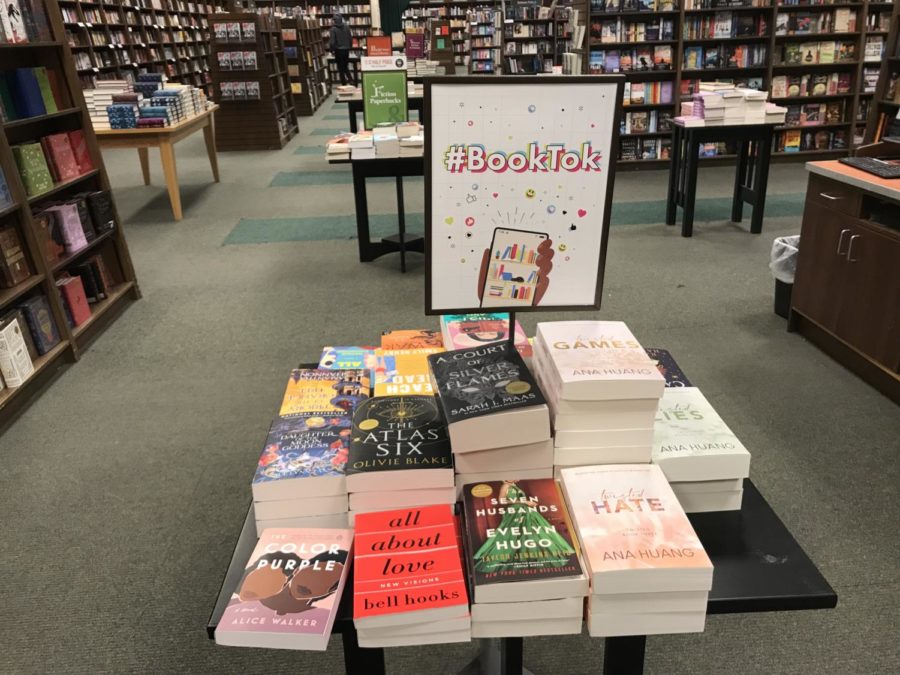Booktok: The Rise of Literature in the Digital Space
Goodreads, Booktube, book blogs — ever since the rise of the internet, online communities full of certified bibliophiles have formed to discuss all types of books. One in particular has risen to prominence in recent years: Booktok.
If you’ve entered a bookstore lately, it’s a guarantee that you’ve run into Booktok themed displays. The community has been cited as a major game changer in how books are advertised, as well as how publishers operate.
The year was 2019, and Barnes and Noble was in a crisis.
The company, once an influential player in book retailing, had been in decline for years. The company’s 2013 fiscal report showed that the bookseller’s consolidated revenue had decreased by 7.4%. In 2019 the company, while slowly getting back on its feet, was still meandering along: Barnes and Noble’s net earnings for the year was 3.8 million, with store sales declining 1.9%. Barnes and Noble closed around 150 stores during the 2010s.
Barnes and Noble was not the only bookseller that suffered, as independent bookstores and big chain retailers all struggled during the 2010s. There are a variety of reasons for the struggles of these retailers, from increased rent prices to the rise of Amazon.
But, post-pandemic, Barnes and Noble seems to be making a resurgence. This is odd, since according to the New York Times, “Many of the chain’s downtown stores in urban areas are still underperforming because of a paucity of tourists and office workers.” During the pandemic, the store held virtually no in-store events to attract customers, with 65% of its stores closing temporarily. So, how did Barnes and Noble, as well as smaller, independent bookstores, manage to stay afloat after the pandemic? One statement seems to echo over and over again: Booktok, a subcommunity on the social media app Tiktok.
TikTok was developed by the Chinese company ByteDance, released in 2016 as the internationalized equivalent to its Chinese counterpart, Douyin. In 2018, Tiktok merged with Musical.ly, a video-creating platform that was already popular at the time. Due to this merging, Tiktok encountered a wide influx of users from Musical.ly, and in 2018 was one of the most downloaded apps in the app store.
TikTok, with its infinite supply of short video content — usually spanning somewhere from between 15 seconds to 3 minutes — was a perfect source of entertainment for people who were bored during lockdown. The app began to attract users that fell outside of its prior demographic of Gen Z. The video content diversified as well, with dance trends being replaced by specific communities focused on hobbies such as cooking, art, and reading.
Booktok sprung up in 2020 gaining popularity after a video by user @caitsbooks using the hashtag #booktok became viral. Videos using the hashtag began to follow suit, and the community grew. As of now, Booktok is now one of Tiktok’s biggest communities, with over one billion views.
Videos on BookTok range from book ‘hauls’ — in which a person buys a substantial amount of books to display online — to videos listing book recommendations by tropes. A trope, according to Dictionary.com, is “a convention or device that establishes a predictable or stereotypical representation of a character, setting, or scenario in a creative work.” Viewers use tropes as a way to sort through a diverse list of books, many of which can span multiple different genres and demographics, into comprehensive lists assorted by what scenarios are prevalent in the story.

Atfirst glance, the videos on Booktok may all seem to follow more or less the same format. They usually stretch fifteen seconds to one minute and include neat displays of books as the thumbnail. Most of these videos consist of book recommendations, with eye-catching headlines such as “Books I Would Sell My Soul To Read For The First Time Again” or “Books That Made Me Sob So Hard I Couldn’t Breathe.” Accompanying these videos are funny bits about reading, such as comedic posts about staying up all night to finish reading a chapter. These videos are short and to the point, enjoyable to watch, and offer a way for community members to bond over their reading experiences.
When you look past the first few videos underneath the hashtag, Booktok resembles less of a cohesive community and more separate groups of users cobbled together. Separate niches arise, fluctuating from videos recounting the histories of specific book genres to authors promoting their own books. There are hashtags dedicated to specific genres, such as #horrorbooktok and #queerbooktok. While discussions about romance and fantasy books dominate the community, these niches still pack a sizable punch.
On Booktok, books are often advertised by their aesthetics, framing the book as a fun activity, not as a chore to get through. Books, for many people, are still synonymous with dense essays for English class and analysis after analysis. By framing reading, not as an intimidating activity and more as a communal experience where having fun is encouraged, more people are emboldened to start reading when they might not have before.
One of the key factors that seem to have aided Booktok’s success is its sense of authenticity. On Tiktok, the short, unfiltered videos often feel as though they were made in an instant, with little preparation done beforehand. It gives the community a more casual, friendly air, as well as a seemingly more authentic experience. In comparison, platforms such as Instagram and Youtube can feel far more artificial, focusing less on a communal experience.
Yet with the growth of the community comes worries about whether the authenticity of the community is safe, as publishing houses spread to Booktok to increase their revenues. There’s been an uptick in sponsored content on Booktok, with paid partnerships between publishers and creators growing more common. When asked about the evolution of sponsored content on Booktok, Tasnim Haque ‘24 said, “It used to be very rare before, but over time and especially now almost all of them are sponsored.” This has caused discussion over the authenticity of Booktok.
Another common complaint among users is that, at a certain point, Booktok can seem like an echo chamber, with creators seemingly recommending the same few books over and over again. These books tend to focus on white, cisgender characters in the romance or fantasy genre, with books featuring POC and/or queer characters often relegated to the sidelines. This issue affects not only books but extends to creators as well, as marginalized creators are often suppressed by the algorithm. This has been a noted issue on the platform for years, and Booktok is no exception to that.
While Booktok has its fair share of problems, it has grown to a considerable size, with publishers viewing it as a game changer in how books are sold. Whatever’s next for the community, it seems to be staying for good.
One of the key factors that seem to have aided Booktok’s success is its sense of authenticity. On Tiktok, the short, unfiltered videos often feel as though they were made in an instant, with little preparation done beforehand. It gives the community a more casual, friendly air, as well as a seemingly more authentic experience
Nehla Chowdhury is an Editor-in-Chief for 'The Science Survey,' as well as a Social Media Editor. Nehla enjoys researching topics for their articles, as...

